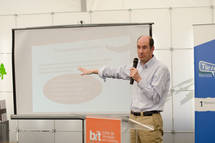Creative Heritage and ICT in the Experience Economy

The targeted promotion of Cultural Heritage becomes more effective if using innovative technology. This was outlined by the presentations and discussions at the second CreativeCH workshop themed “Creative Heritage and ICT in the Experience Economy”, which was hosted by the University of Coimbra at the INVTUR/BiT 2012 Conference in Aveiro, Portugal, on May 17, 2012.
Combining cultural heritage and new technologies to a unique experience was the idea which was explored at the second CreativeCH workshop. In this age of smartphones and tablets, especially mobile applications offer a wide range of possibilities.
“Increasing competition in the market means that goods and services are no longer enough and that producers must differentiate their products by transforming them into ’experiences‘, which engage the consumer”, stated Professor Luís Moura Ramos from the Faculty of Economics at the University of Coimbra. He presented the concept of the ’experience economy’. The expert in economics also pointed out that the purchase of an experience gives the user the chance to enjoy a series of memorable events that engage the consumer in a personal way. Especially the cultural and creative sectors are economic drivers that can contribute to this experience economy.
Miguel Silvestre, from the Municipality of Óbidos, expounded on how this small community of 11,000 inhabitants was able to revitalize itself and attract more visitors by offering creative experiences for the visitor through festivals organised throughout the year.
Another way of enhancing the user’s experience are mobile applications. Patrick Burkert, one of the developers of Zeitfenster, discussed how an augmented reality time travel app allows the user to view places and buildings of the past. The idea is using time windows to display a historic picture overlaid on the real object, which can be merged together thus displaying the photo with the actual image in the background. According to Burkert, a student from Stuttgart Media University in Germany, a closer cooperation between museums and technology experts offers the users the opportunity to access content to which they normally do not have access.
Another great chance to explore the cultural heritage and touristic places through the use of technology was presented by Alexandre Pinto from iClio, developer of another mobile application for travel called Just in Time Tourist. The app uses an iPhone, iPad or Android to design a personalized audio guide for the tourist, generating dynamic sightseeing routes, detailed maps and public transportation information – particularly for those who only have time for a short tour such as business travelers.
The second CreativeCH workshop generated interest among the visitors of the INVTUR/BiT Conference and closed with a lively discussion on cultural heritage and ICT – a theme that is attracting global attention from the cultural and creative sectors.
Host Professor Joaquim Carvalho summed up the workshop by recommending that the institutions that have the content should prepare it efficiently with the new technology to adapt it to the user’s experience. Professor Carvalho also emphasized that “proper production of content is absolutely central. In the end we need people to bridge the gap between content and technology and select, prepare and adapt it.”
Text: Katherine Johnson, UoC
Videoblog of the Workshop
Workshop Fotos
Next Workshop
Citizen Cultural Participation | November 2012
Download Presentations
Patrick Burkert - Zeitfenster [7.86 mb]
Luis Moura Ramos - The experience economy and local development [1.01 mb]
Alexandre Pinto - Just in Time Tourist [5.77 mb]
Miguel Silvestre - Óbidos Creativa [1.23 mb]
Videos
Videos of this and other workshops you can find here
FULL WORKSHOP REPORT



